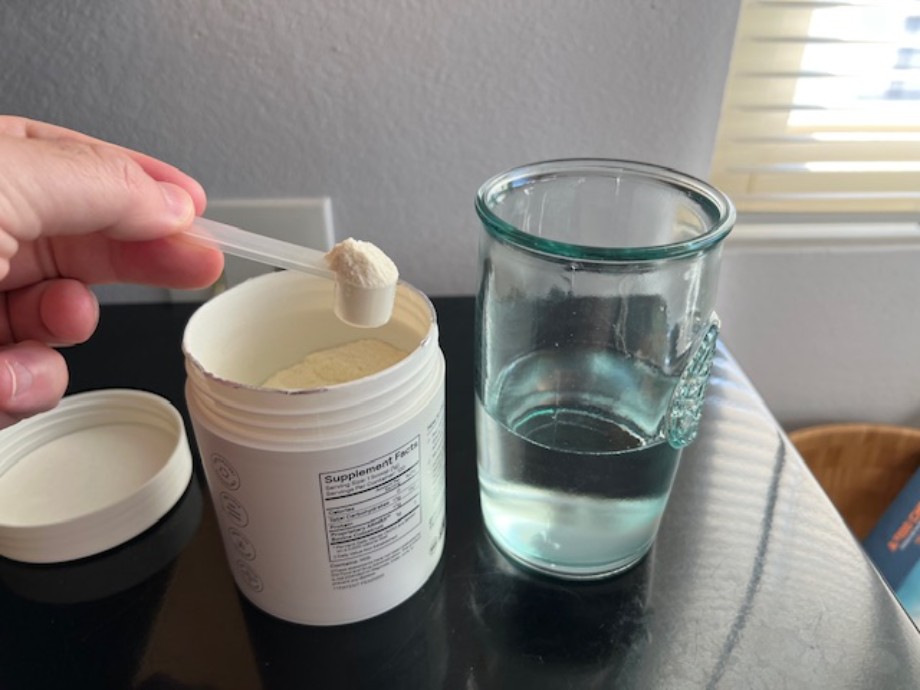We test and review fitness products based on an independent, multi-point methodology. If you use our links to purchase something, we may earn a commission. Read our disclosures.
If you’re interested in health and fitness, there’s a good chance you’ve heard about the importance of protein intake. Depending on how long you’ve been regularly exercising, you may even have your favorite protein supplements, whether it’s one of the best protein powders or a delicious protein bar.
However, one interesting supplement that’s gaining popularity is colostrum. Similar to whey and casein protein, colostrum is sourced from cow’s milk and is packed with important nutrients like protein, fatty acids, and antioxidants.
If you’ve never heard of this colostrum or aren’t sure what it does, I’ve got you covered. In this guide, I’ll share some important colostrum supplement benefits, who should use it, and how to get started.
Key Takeaways
- Colostrum has been shown to increase upper and lower-body strength1, lean muscle mass, and muscle thickness in athletes.
- Colostrum is the first bit of cow’s milk secreted after giving birth that contains higher levels of protein.
- Colostrum is often referred to as “first milk” and “bovine colostrum.”
- Colostrum supplements come in powder and pill form. For protein supplementation, the recommended dose is 20 to 60 grams.
What is Colostrum?
Thanks to social media, colostrum supplements are becoming quite popular. These pills and powders claim to boost the immune system, skin health, gut health, muscle recovery, and more.
RELATED: ARMRA Colostrum Review
Before we get into the research-backed benefits of colostrum, let’s first look at what it is. Colostrum is the first breast milk produced by the mammary glands after birth. It contains a high amount of bioactive compounds like antioxidants, antibodies, and cytokines to strengthen the immune system of newborns.
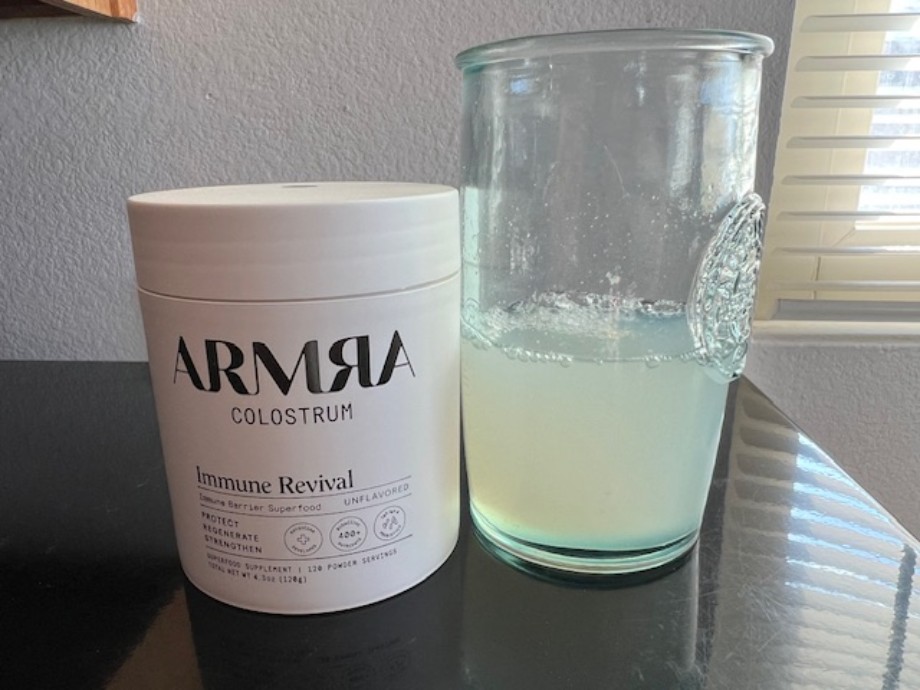
Colostrum is rich in protein, carbohydrates, and enzymes like lactoferrin, which helps protect against bacteria. It also contains insulin-like growth factor 1 (IGF-1), which helps support bone and tissue growth.
Most dietary supplements use colostrum sourced from cow’s milk, but you don’t need to be a newborn calf to benefit from it, as humans also produce it. Breastfed babies require additional nutrients in the days after they’re born, and colostrum is produced during those first few days.
Similar to human colostrum, bovine colostrum has been shown2 to be rich in nutrients, immunoglobulins, peptides with antimicrobial activity, and growth factors that are important for the development and immune health of baby calves.
Colostrum Supplement Benefits
Bovine colostrum may support baby cows, but is it useful for humans? According to the clinical trials, yes. Here are some of the most important health benefits of colostrum supplementation.
May Improve Gut Health
One of the most important benefits of colostrum is its ability to improve gut health. Many of these supplements claim to reduce bloating and heartburn, strengthen the gut barrier, and resolve digestive issues.
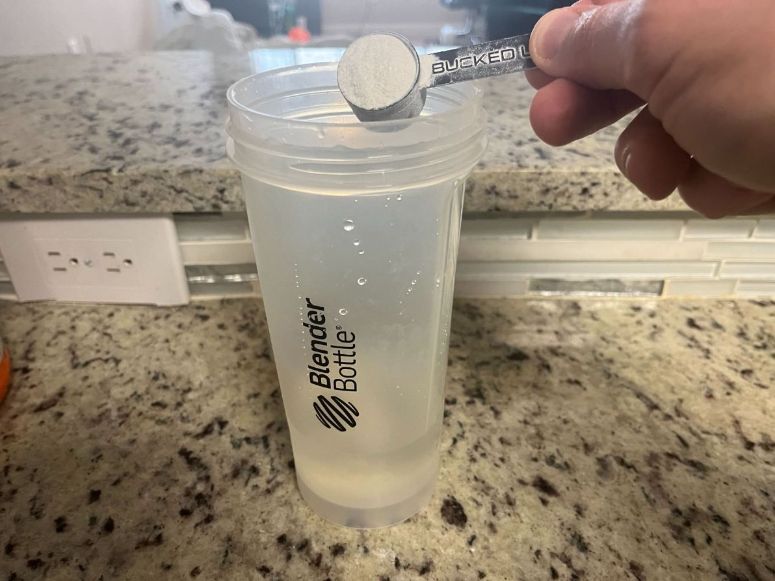
The lining of our small intestine is meant to keep toxins and bacteria out of our bloodstream, but it can develop leaks, allowing these harmful substances to enter our blood and cause side effects. This increased intestinal permeability is usually referred to as “leaky gut,” and colostrum is often used to strengthen this barrier and relieve symptoms.
A 2021 systematic review3 published in Nutrients looked at the impact of supplementing with bovine colostrum to address leaky gut and found substantial evidence that it can reduce inflammatory bowel disease, as well as incidences of colitis and infectious diarrhea.
May Increase Strength and Muscle Recovery
Colostrum is a dairy protein similar to whey and casein. It’s often used as a protein supplement to support muscle growth and strength gains, especially when paired with a regular workout routine.
Research shows1 that using this supplement alongside resistance training increased bench press strength, muscle thickness, lean tissue mass, bone mineral content, and cognitive scores. However, the study compared colostrum to whey protein, and both groups experienced the same gains.
The authors concluded that while colostrum certainly helps with muscular growth and recovery, which can improve exercise performance, it’s not any better than whey protein. Whey is almost always significantly more affordable than colostrum and may be a better choice for those purely focused on muscle growth.
RELATED: How Much Protein Do I Need?
May Support Immune Health
Colostrum is rich in nutrients that support immune health, as newborn humans and baby cows often have weakened immune systems. Many people use these supplements for a healthy immune response, as colostrum decreases inflammation and may create several metabolic changes.
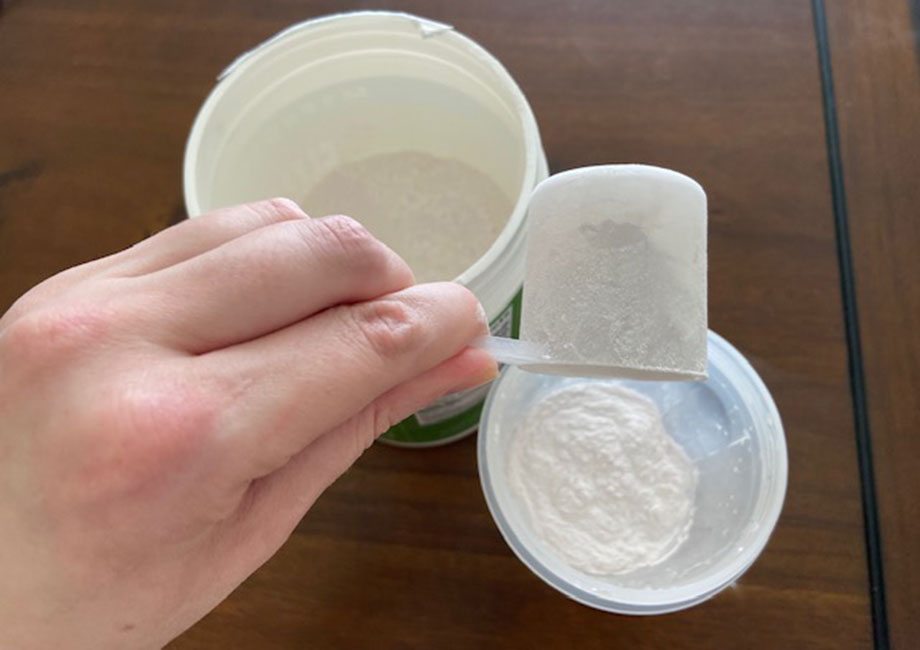
A 2023 study4 published in Nutrients looked at the effect of drinking colostrum-enriched milk in older adults and found positive results. The authors concluded that “consuming bovine colostrum milk may induce metabolic changes and reduce the expression of various pro-inflammatory mediators, thus improving the immune function in older adults.”
This also may be due to the levels of immunoglobulin G (IgG) and immunoglobulin A (IgA), two immunoglobins that help protect newborns from bacteria, pathogens, and infection.
This study wasn’t performed directly on the supplement form, but we can likely expect the same anti-inflammatory, immune-boosting results from using a pill or capsule.
Colostrum for Muscle Growth
Muscle growth is one of the most sought-after benefits of bovine colostrum. After all, colostrum comes from the same source as whey protein, one of the most popular supplements, and as it’s richer in nutrients, you may expect great results.
While research has shown that bovine colostrum supplements improve strength and lean muscle tissue1, there’s one caveat. The study compared colostrum to whey protein, and both groups had similar outcomes. The study also used 60 grams of colostrum compared to 38 grams of protein, and given the high cost of colostrum, taking 60 grams per day would be prohibitively expensive for most.
RELATED: 8 Whey Protein Benefits
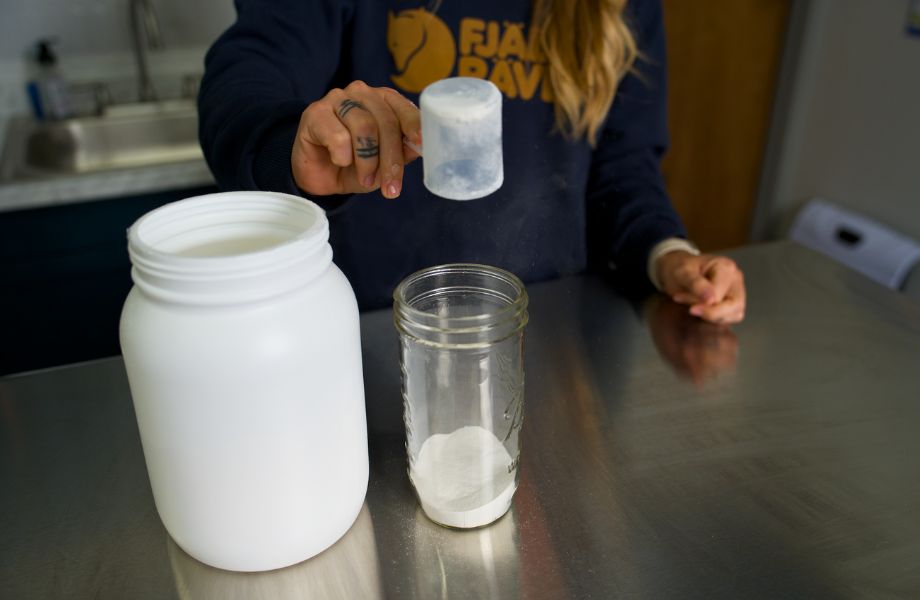
This means that while we can certainly claim that colostrum helps muscle growth, we can’t say it’s any better than regular whey protein. Considering it’s significantly more expensive, it may not make the most sense to rely on it as your primary source of protein, though adding it to your supplement stack certainly won’t hurt.
Colostrum Supplements for Athletes and Bodybuilders
Given that colostrum isn’t any better than whey protein powder for muscle growth, should athletes, bodybuilders, and fitness enthusiasts who want to build muscle consider using it? Depending on your goals, yes.
In addition to supporting muscle growth, colostrum has been shown to support a healthy gut3 and robust immune system4. This may be quite useful for anyone looking to build muscle or lose fat, especially bodybuilders who go through alternating phases of intentional weight gain and weight loss.
During traditional bulking seasons, bodybuilders are on a quest to build muscle and often have to eat large amounts of food to gain weight, which isn’t easy on the digestive system. Colostrum may relieve IBS, diarrhea, and other digestive issues that come with excessive food intake.
When it’s contest prep season, bodybuilders need to get very lean, often eating low levels of food and losing as much body fat as possible. Many bodybuilders find that constant dieting can leave them feeling tired and worn out, which is the perfect time to boost the immune system with colostrum.
Athletes may also benefit from the enhanced immune system, though it may not directly increase athletic performance. A 2023 study5 found that colostrum protected against upper respiratory infection in athletes, making it a useful supplement for those who are regularly exposed to germs and bacteria from other people.
How to Take Colostrum for Muscle Growth
If you’re considering adding bovine colostrum to your supplement stack for muscle growth, keep a few things in mind.
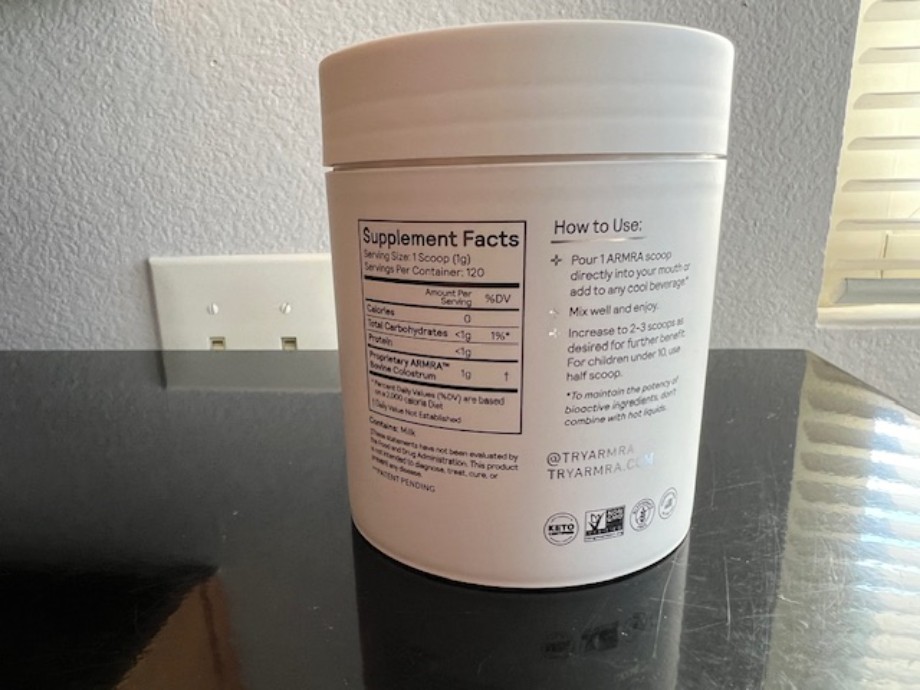
First, the study that showed similar muscle growth results as whey protein1 compared 60 grams of colostrum to 38 grams of whey protein. Even if the two products cost the same, you’d need more colostrum than whey protein, but colostrum is significantly more expensive.
RELATED: How Much Protein Do You Need to Build Muscle?
Because of this, you may want to use whey protein as your main protein source and add colostrum for its gut health and immune system benefits. Relying on colostrum to provide enough protein for muscle growth could quickly become very expensive.
The optimal dosing is unclear. Some studies have shown positive benefits from as little as 500 milligrams per day, while other studies used up to 60 grams per day. Most colostrum supplements are sold in 1- to 3-gram doses.
Benefits of Colostrum: Final Thoughts
While still a lesser-known supplement, bovine colostrum has many potential benefits. It can boost immunity, support a healthy gut microbiome, and boost muscle growth. It’s sourced from cow’s milk, just like whey and casein protein, though it’s significantly more expensive compared to most protein supplements.
If you struggle with gut health issues like bloating or IBS, or you want to strengthen your immune system, colostrum is a great supplement to add. There are some benefits of colostrum for athletes, but if you’re primarily focused on strength and muscle, you may want to stick with whey protein instead.
- Colostrum is produced in the first few days after giving birth and is rich in protein, antioxidants, and antibodies.
- While colostrum is a powerful tool to improve gut and immune health, using it for muscle growth could be very expensive.
- The recommended dose of colostrum varies greatly from study to study, but benefits have been shown using doses ranging from 500 milligrams to 60 grams.
Benefits of Colostrum: FAQ
What are the benefits of taking colostrum capsules?
Colostrum supplementation has been shown to strengthen the immune system, support a healthy gut, and promote muscle growth and recovery when used regularly.
Is it safe to take colostrum every day?
Yes. Colostrum is sourced from dairy, so as long as you don’t have any issues with lactose, it’s safe to consume every day, just like any other dairy-based supplement. As the FDA doesn’t tightly regulate supplements, we suggest choosing a brand that uses third-party testing and strict manufacturing standards.
What are the side effects of taking colostrum?
Due to its lactose content, colostrum may cause upset stomach, bloating, gas, and other digestive issues in individuals who have a milk allergy or are sensitive to dairy products.
Who should not take colostrum?
Anyone with dairy sensitivities should avoid colostrum and may want to consider a lactose-free protein powder instead. Bovine colostrum also contains estrogen, so individuals with a high risk of certain types of cancer may need to avoid this supplement. As with all dietary supplements, be sure to speak with a physician, registered dietitian, or healthcare provider before taking anything new.
Is colostrum a superfood?
Due to its high nutrient content, many consider colostrum a superfood. It’s only produced in the days immediately after giving birth and contains more antioxidants and antibodies than standard milk or dairy products.
References
- Duff, W. R., Chilibeck, P. D., Rooke, J. J., Kaviani, M., Krentz, J. R., & Haines, D. M. (2014). The effect of bovine colostrum supplementation in older adults during resistance training. International journal of sport nutrition and exercise metabolism, 24(3), 276–285. https://doi.org/10.1123/ijsnem.2013-0182
- Playford, R. J., & Weiser, M. J. (2021). Bovine Colostrum: Its Constituents and Uses. Nutrients, 13(1), 265. https://doi.org/10.3390/nu13010265
- Chandwe, K., & Kelly, P. (2021). Colostrum Therapy for Human Gastrointestinal Health and Disease. Nutrients, 13(6), 1956. https://doi.org/10.3390/nu13061956
- Ooi, T. C., Ahmad, A., Rajab, N. F., & Sharif, R. (2023). The Effects of 12 Weeks Colostrum Milk Supplementation on the Expression Levels of Pro-Inflammatory Mediators and Metabolic Changes among Older Adults: Findings from the Biomarkers and Untargeted Metabolomic Analysis. Nutrients, 15(14), 3184. https://doi.org/10.3390/nu15143184
- Baśkiewicz-Hałasa, M., Stachowska, E., Grochans, E., Maciejewska-Markiewicz, D., Bühner, L., Skonieczna-Żydecka, K., & Hałasa, M. (2023). Moderate Dose Bovine Colostrum Supplementation in Prevention of Upper Respiratory Tract Infections in Medical University Students: A Randomized, Triple Blind, Placebo-Controlled Trial. Nutrients, 15(8), 1925. https://doi.org/10.3390/nu15081925
Further reading

In our Trifecta meal delivery review, we’ll go over our experience with this meal delivery service catered toward athletes and those with fitness goals. Read more

Looking for a smartwatch that can track your important fitness milestones? This Withings ScanWatch review could help you decide if this is the watch you seek. Read more

This BalanceFrom Open Trap Bar review will explain how a budget-friendly bar is great for everything from beginner exercises to powerlifting reps. Read more

If you’re interested in health and fitness, there’s a good chance you’ve heard about the importance of protein intake. Depending on how long you’ve been regularly exercising, you may even have your favorite protein supplements, whether it’s one of the best protein powders or a delicious protein bar. However, one interesting supplement that’s gaining popularity is colostrum. Similar to whey and casein protein, colostrum is sourced from cow’s milk and is packed with important nutrients like protein, » Read more about: Colostrum Supplement Benefits » Read more

